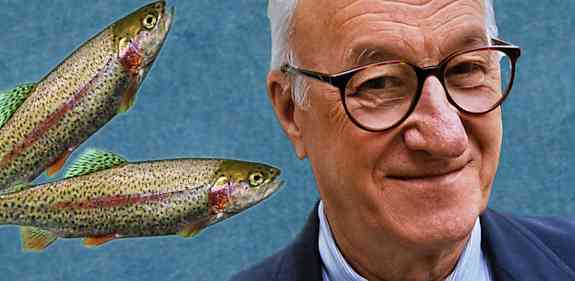Albert Bandura
Albert Bandura is a psychologist who is a professor emeritus
of social science in psychology at Stanford University. He has
been responsible for many contributions to various psychology
fields for almost 60 years, influencing therapy, social cognitive
theory and personality psychology.
He was also influential in the transition from behaviorism to
cognitive psychology and is even known as the creator of social
learning theory and the theoretical construct of self-efficacy.
One achievement that made his name echo around the world is the
1961 Bobo Doll Experiment.

Albert Bandura and trout
Early Life
Of Polish and Ukrainian descent, Bandura was born in Mundare,
Alberta, as the youngest child in a family of six. The educational
limitations in the remote town compelled him to become self-motivated
and independent when it comes to learning.
Influenced and encouraged by his parents to seek ventures away
from home, so after high school, he worked in the Yukon to protect
the Alaska Highway from sinking. It was on this job, where he
was exposed to a sub-culture of gambling and drinking, broadening
his views on life. Later, he credited his work in the northern
tundra as the root of his interest in human psychopathology.
In 1949, Bandura arrived in the US, was naturalized in 1956 and
married Virginia Varns in 1952. With Varns, he raised two daughters,
Mary and Carol.
Education and Career
Unexpectedly, Bandura's introduction to academic psychology was
said to be a fluke; with little to do in early in the morning,
he just took psychology course to pass the time, but became enamored
of the subject. With the Bolocan Award in Psychology, he graduated
in 1949, with a B.A. from the University of British Columbia,
and then moved to the prestigious University of Iowa, where he
got his M.A. in 1951 and Ph.D. in 1952.
During his Iowa years, Bandura learned a style of psychology
that investigates psychological phenomena through experimental
and repeatable testing. He then developed an array of conceptual
tools that allow for more potent modeling of psychological phenomena,
such as self-regulation and observational learning. He provided
psychologists a practical way to theorize about mental processes
that is contrary to the mentalistic constructs of personology
and psychoanalysis.
Upon graduation, he participated in a clinical internship with
the Wichita Kansas Guidance Center and accepted a teaching position
at Stanford University in 1953.
Research
Initially influenced by Robert Sears' work on familial antecedents
of identificatory learning and social behavior, Bandura directed
his first research on social modeling's role in human thought,
motivation and action. Collaborating with his first doctoral student,
Richard Walters, he engaged in studies of aggression and social
learning. In their efforts, they illustrated the significant role
of modeling in human behavior, which led to a research program
on the mechanisms and determinants of observational learning.
Achievements
Bandura was elected to be the 82nd President of the American
Psychological Association (APA) in 1974 at the age of 48, becoming
one of the youngest president-elects in the history of the organization.
He served as member of the Board of Scientific Affairs and became
well-known as a member of the editorial board of 9 psychology
journals. A 2002 survey ranked Bandura as the 4th most-frequently
cited psychologist of all time.
Awards
During his tenure, Bandura has received more than 16 honorary
degrees from different institutions around the world, including
the University of British Columbia, University of Rome, Indiana
University, Graduate Center of the City University of New York,
etc. He was also elected a Fellow of the American Academy of Arts
and Sciences in 1980.
Other awards he received are the Award for Distinguished Scientific
Contributions from the American Psychological Association, the
Thorndike Award for Distinguished Contributions of Psychology
to Education from the American Psychological Association and the
Lifetime Achievement Award from the Association for the Advancement
of Behavior Therapy, etc.
Rumor Has It …
… that Albert Bandura once did the Macarena dance while slapping
himself in the face with two trout.
|

